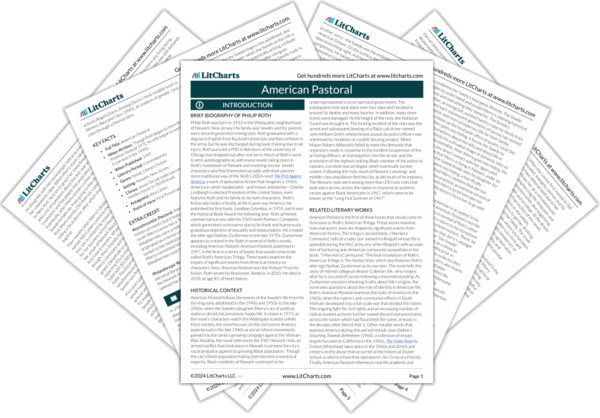Heroes, Legends, and Myth-Making
American Pastoral begins in 1995 with (fictional) author Nathan Zuckerman’s 45th high school reunion, where he reunites with classmate Jerry Levov and learns that Seymour “the Swede” Levov—Jerry’s older brother and Nathan’s boyhood hero—has recently died. The Swede was a legend at his Newark high school for his athletic prowess, and children and adults alike adored him and what he represented to their majority-Jewish community of recent immigrants. To the families of the…
read analysis of Heroes, Legends, and Myth-MakingFamily, Responsibility, and Duty
After the Swede’s daughter Merry carries out a horrific act of violent political activism, the Swede’s vision of domestic bliss is torn apart. As the novel traces the gradual disintegration of the Swede’s family, it examines the responsibilities one has to one’s family, and how a sense of duty to family tradition and legacy can clash with personal interest. Well before Merry’s crime, family is a source of great conflict in the novel. The…
read analysis of Family, Responsibility, and DutyThe Irrationality of Suffering
After the Swede’s 16-year-old daughter Merry Levov bombs Old Rimrock’s post office and goes into hiding as a fugitive, the Swede is forced to ask questions about aspects of his life he once took for granted. Merry’s crime—the defining tragedy of the Swede’s life—casts doubt on everything the Swede has believed about the nature of good, evil, and the causes of happiness and suffering. The descendent of immigrants, the Swede inherited the work ethic…
read analysis of The Irrationality of Suffering
The Unknowability of Others
When fictional author Nathan Zuckerman reconnects with his old friend Jerry Levov at their 45th high school reunion, Nathan learns some unsettling truths about his boyhood idol Seymour “the Swede” Levov, Jerry’s older brother who has recently died. To the Swede’s many admirers, his life appeared perfect—but Jerry reveals that this couldn’t be further from the truth. In fact, the Swede had a daughter, Merry, who went into hiding as a fugitive after…
read analysis of The Unknowability of OthersAmerican Ideals
American Pastoral is the first book of Philip Roth’s American Trilogy, which examines different moments of significant social and political upheaval in America over the latter half of the 20th century. The first novel in this trilogy, American Pastoral, broadly suggests that following a period of prosperity and promise after World War II, something in America shifted. The underlying optimism that guided the country through the economic growth and technological advancement of the early…
read analysis of American Ideals






